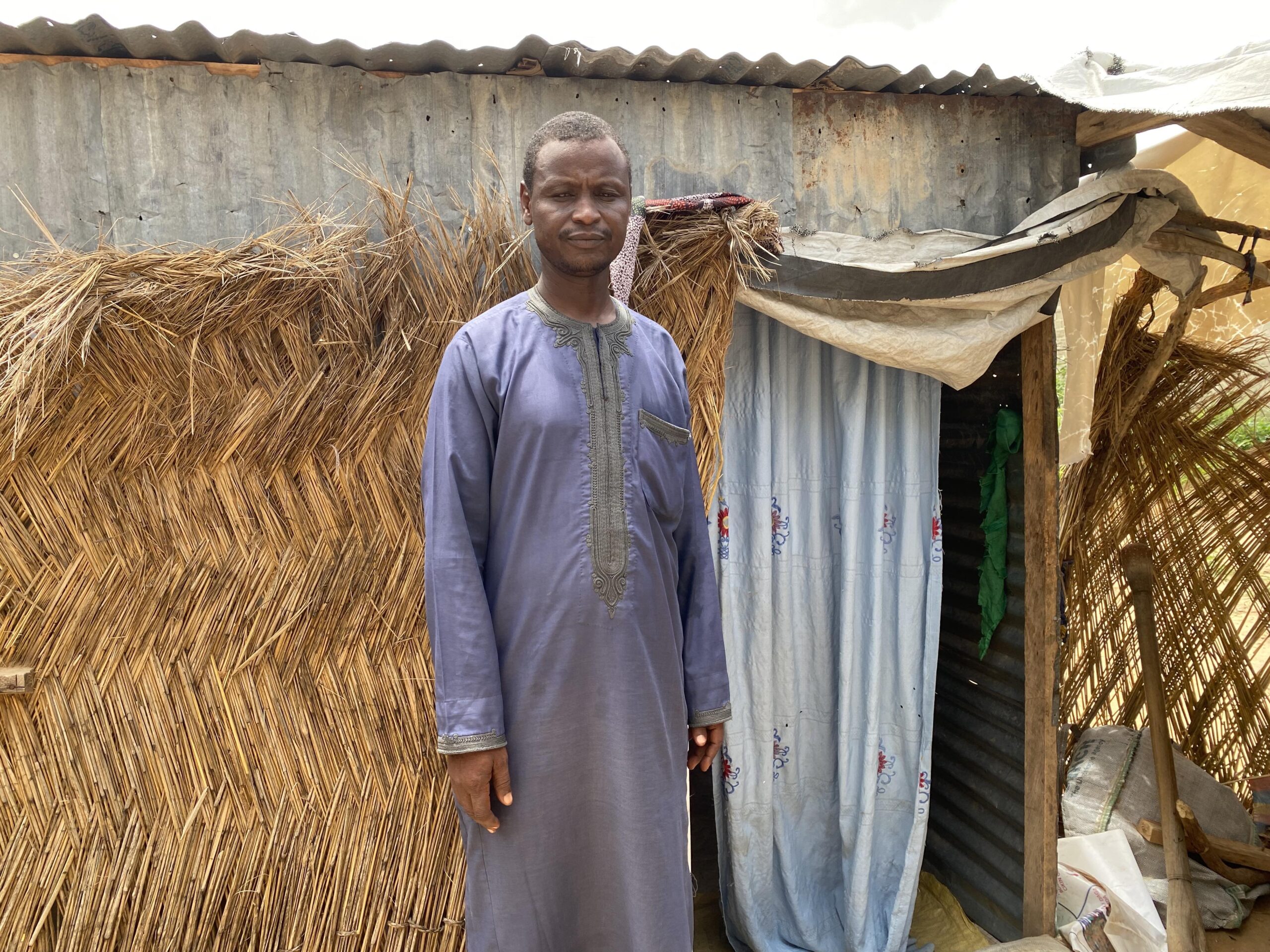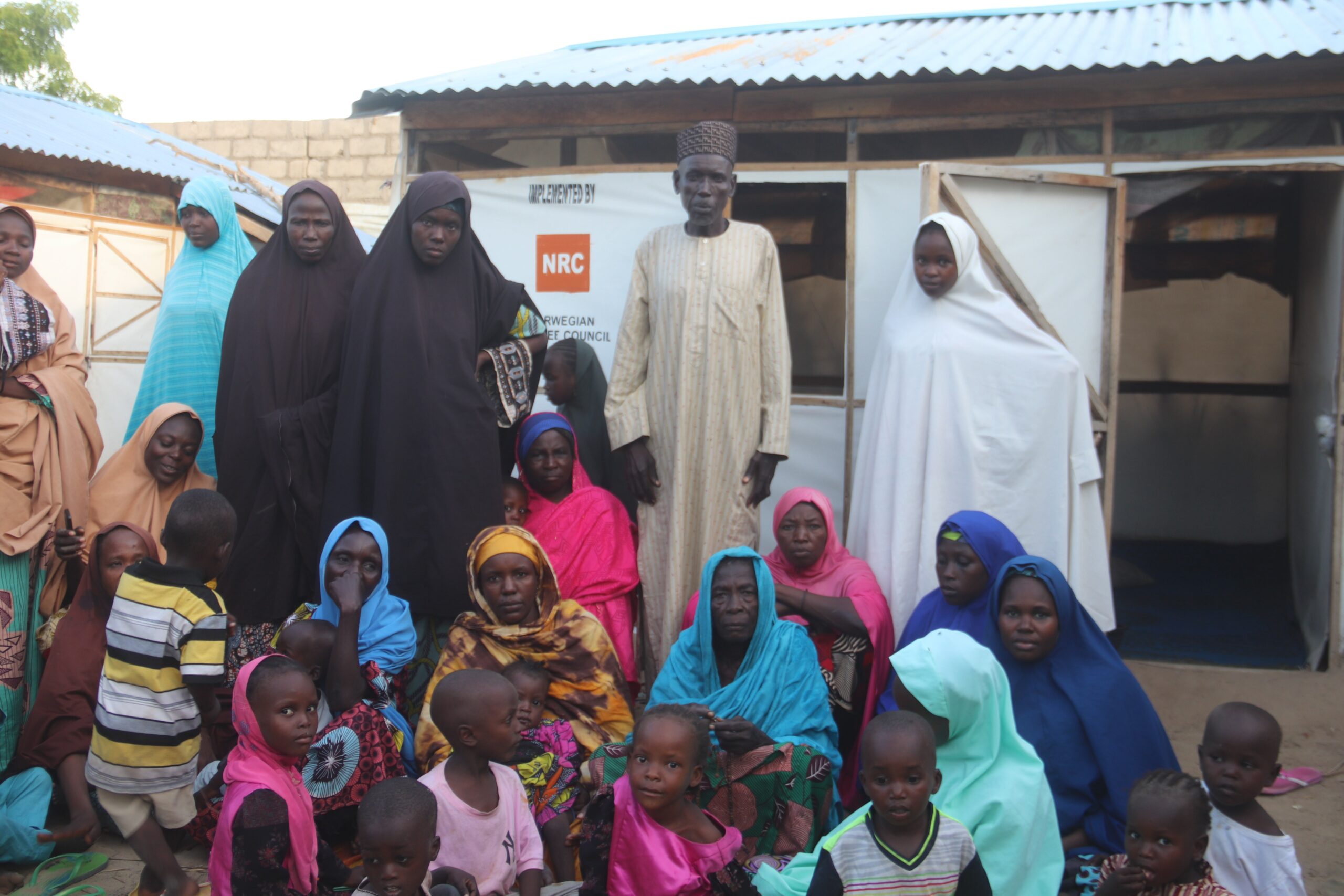Caught in the turmoil of war and climate change
Millions of Sub-Saharan Africans have been forced to flee their homes in recent years. Is it due to climate change or conflict? The government can't decide
Nana Mohammed • March 7, 2024

Ali Bakka, standing in front of the makeshift home he built for his two wives and eight children in Maiduguri, Nigeria. [Photo Credit: Usman Abba Zanna]
For Ali Bakka, Lake Chad is a fading memory now: a place where he once could freely graze his animals in a valley shared by four African nations. A place where a young herdsman could proudly provide for his growing family.
But that was before the killings, kidnappings, thefts and famines that have beset the region since the onset of the blood-soaked Boko Haram rebellion against the Nigerian government and their ban on western education, especially for women.
Long before the Islamic insurgency began in 2009, life along the banks of what was once one of Africa’s largest lakes—one that still provides food and water for about 50 million people—was already deteriorating.
Every year, as Lake Chad shrank and the soil lost its fertility, it became harder for Bakka to find patches of green for his cows, sheep, goats and donkeys.
The atrocities of Boko Haram—jihadists murdered Bakka’s younger brother, uncle and father-in-law, and stole his cows—were just the final calamity that forced Bakka and his family to flee their home.
Today, the 45-year-old is jobless with two wives and eight children and lives 100 miles away from his former home in the crowded Nigerian city of Maiduguri, where he struggles to make enough money to feed his family. The memories of happier times, he says, are agony.
“These are the most painful parts for me,” Bakka says, speaking in Hausa, the most common language spoken in a fractious, diverse region. “Life is hard, and I cannot afford food, school fees and decent shelter for my wives and children.”
War and climate change are combining to make the lives of millions of people miserable in Sub-Saharan Africa, especially in places like Lake Chad that are undergoing rapid environmental change. But experts say it’s difficult to know how much to blame climate change for the chaos because there are so many other disruptions, including violence, famine and the overuse of water and other natural resources.
The government and the people deny the climate issue both because of a lack of knowledge of climate change and because of the uncertainty of the extent to which climate issues exacerbate and worsen insurgency, says Alexandra Lamarche, a senior fellow at the nonprofit group Refugee International. Leaders of the region are not paying attention to the compounding effect that climate change can have on such violence.
“Much more needs to be done by the Lake Chad Basin countries to tackle the link between climate change, violence and displacement,’’ she says.
The Chad Basin commission is creating a new short-term strategy, and there is some talk about incorporating more climate issues. “But it’s very superficial, and I think it’ll be more of an effort to say that they have done it rather than fully commit to it. They’re just not dealing with it properly,’’ Lamarche adds.
In a recent report, she wrote that insufficient attention is paid to how climate change has fueled insecurity and forced displacement of 3 million people and left 11 million people in need of humanitarian assistance.
This is partly because the crimes of Boko Haram tend to overshadow the dire but slower-moving consequences of climate change. In 2014, the group kidnapped and enslaved 270 school girls, which elicited worldwide outrage. Meanwhile, millions of people from across the entire Lake Chad Basin — including in Cameroon, Chad, Niger and Nigeria — have been displaced in recent years.
These kidnappings and other atrocities committed by Boko Haram exacerbate the situation, especially for the communities living within the fringes of the Lake Chad region.
While experts agree that Lake Chad shrank by more than 90 percent from the 1960s to a low of less than 2,000 square kilometers (about 800 square miles) in the 1980s, it has been stable more recently and may actually be increasing slightly. But the damage has already been done for millions of people who relied on the lake for their livelihoods.
Satellite images show that the northern pool of the lake has continued to shrink slightly, while the southern pool in Nigeria is actually increasing due to increased rainfall and higher flows from the Chari-Logone River, according to a 2020 study.
The region’s rivers and vast underground aquifers are continuing to replenish the lake, despite long periods of drought and overuse in past decades, according to the author of that study, Binh Pham-Duc, an environmental engineer at the University of Science and Technology in Hano, Vietnam.
In light of the current data, urgent calls by African leaders to save Lake Chad may be slightly exaggerated and designed to secure more aid from Western countries, according to Vincent Foucher, who studies armed conflict at the National Center for Scientific Research in Paris. It is undeniable that climate change is affecting Africa, but impact claims need to be evaluated critically, he adds.
While temperatures in the region are rising, and the regional environmental and security crises have been devastating, the lake itself is not about to disappear completely, according to Foucher. “What I am saying is that the vanishing of Lake Chad may be a narrative put together by the government to attract funding,’’ he explains.
Regardless, other experts say the lake’s condition remains urgent and is directly linked to global climate change, which is altering rainfall patterns and raising temperatures. That’s the view of Vincent Nduka Ojeh, who studies African climate change at the University of Gambia.
“It is not surprising that millions of the desperate who migrate on boats to Europe are young Africans, who could not bear the harsh pains of poverty and violence. I will say that climate change and bad leadership are all contributing factors,’’ Ojeh says.

Abbiso Aisami and his wife and children outside of their tin-roofed home in the outskirts of Baga Road, in Maiduguri, Nigeria. [Photo credit: Bitrus Kurust]
Abbiso Aisami, 58, is one of those unhappy migrants. He, too, now lives in a makeshift shelter on the fringes of Maiduguri with his wife and 11 children.
Aisami first noticed Lake Chad was shrinking in 1983, which was a shock to him and his neighbors. He had always considered the lake to be a miracle from God, never expecting that parts of it could vanish.
“There were a lot of animals like hippopotami that we never knew lived under the water. Of course, most of them died, and there were lots of dead fish too, because the water level was too low and they died,’’ he remembers.
Aisame and his family moved around all over the region, looking for a place where he could find fish. He finally fled south because of Boko Haram’s violence.
For refugees like Aisami and Ali Bakka, who now beg on the streets of Maiduguri to feed their families, it is hard to be hopeful about the future, but they try to continue their search for a better life, even as they cling to memories of home.
“Just like today and every other day, life is hard for me. I am waking up wondering where the next meal will come from,” he says. But whatever the situation, “I feel grateful that God kept me alive.”
3 Comments
ow has the shrinking of Lake Chad affected the livelihoods and cultural practices of local communities like Aisami’s?
This piece powerfully highlights the devastating intersection of conflict and environmental stress in Sub-Saharan Africa. It makes you wonder how policymakers can effectively untangle causation when both factors are so intertwined.
Excellent breakdown straightforward and super useful.